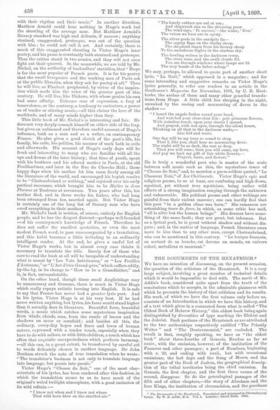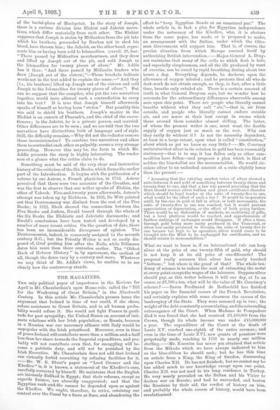THE DOCUMENTS OF THE HEXA.TETJCH.* WE have no intention of
discussing, on the present occasion, the question of the criticism of the Hexateuch. It is a very large subject, involving a great number of technical details which it would be impossible to deal with. The merit of Mr. Addis's book, considered quite apart from the truth of the conclusions which he accepts, is the admirable plainness with which he presents the history of that criticism and its results. His work, of which we have the first volume only before us, consists of an Introduction in which we have this history, and of a text which gives in a connected form what is called "The Oldest Book of Hebrew History," this oldest book being again distinguished by diversities of type marking the Elohist and the Jahvist. Such portions of the Hexateuch as are attributed to the two authorships respectively entitled " The Priestly Writer " and " The Deuteronomist," are excluded. The result is that, roughly speaking, we have as " the oldest book" about three-fourths of Genesis, Exodus as far as xxxiv., with the omission, however, of the institution of the Passover and other passages ; a part of Numbers, beginning with x. 29, and ending with xxxii., but with occasional omissions; the last days and the Song of Moses, and the greater part of the Book of Joshua, the geographical descrip- tion of the tribal territories being the chief omission. In Genesis, the first chapter, and the first three verses of the second, disappear. So do the genealogical passages of the fifth and of other chapters,—the story of Abraham and the four Kings, the institution of circumcision, and the purchase • Tho Documents of the Hexatinsoh. Translated and Arranged in Chronological Order. By W. E. diddle, M.A. Vol., I. London r. David Nutt, 1892. of the burial-place of Machpelah. In the story of Joseph, there is a curious division into Elohist and Jahvist narra- tives, which differ materially from each other. The Elohist supposes that Joseph is stolen by Midianites from the pit into which his brothers, persuaded by Reuben not to shed his blood, have thrown him ; the Jahvist, on the other hand, repre- sents him as having been sold to Ishmaelites. (xxxvii. 28, has: " There passed by Midianites merchantmen, and they drew and lifted up Joseph out of the pit, and sold Joseph to the Ishmaelites for twenty pieces of silver." Mr. Addis has it thus : "And there passed by Midianite traders who drew [Joseph out of the cistern]."—These brackets indicate words not in the text added to explain the sense.—" And they [i.e., his brothers] lifted up Joseph out of the cistern and sold Joseph to the Ishmaelites for twenty pieces of silver.") But Joan we suppose that the compiler, who put the two narratives together, would have allowed such a contradiction to creep into his text ? It is true that Joseph himself afterwards speaks of himself as having been " stolen." But possibly this was said to shield his brothers. Joseph's master in the Elohist is an eunuch of Pharoah's, and the chief of the execu- tioners ; in the Jahvist, he is a private person, and married Other differences are to be seen ; and we are told that the two narratives have distinctions both of language and of style. Still, the difficulty remains,—Why did not the redactor remove these inconsistencies ? To combine two narratives and allow them to contradict each other so palpably, seems a very strange proceeding. However this may be, the form in which Mr. Addis presents the story is highly interesting. The reader sees at a glance what the critics claim to do.
Something must be said of the very clear and instructive history of the criticism of the Six Books, which forms the earlier part of the Introduction. It begins with the publication of a volume by one Astruc, a French physician, in 1753. Astruo perceived that there were two accounts of the Creation, and was the first to observe that one writer speaks of Elohim, the other of Yahveh. Five-and-twenty years afterwards, Astruc's attempt was taken up by Eichhorn. In 1805, De Witt pointed out that Deuteronomy was distinct from the rest of the Five Books; in 1822, Bleek showed the connection between the Five Books and Joshua, Ewald traced through the whole of the Six Books the Elohistio and Jahvistic documents ; and Ewald's conclusions have been tested and developed by a number of more recent critics. On the question of date, there has been no inconsiderable divergence of opinion. The Deuteronoraist, indeed, is commonly assigned to the seventh century B.O. ; but the Priestly Writer is not so easily dis- posed of, Graf putting him after the Exile, while Dillmann dates him more than three centuries earlier. The "Oldest Book of Hebrew History " is, by agreement, the earliest of all, though the dates vary by a century and more. Whatever we may think of Mr. Addis's views, he enables us to see clearly how the controversy stands.



































 Previous page
Previous page